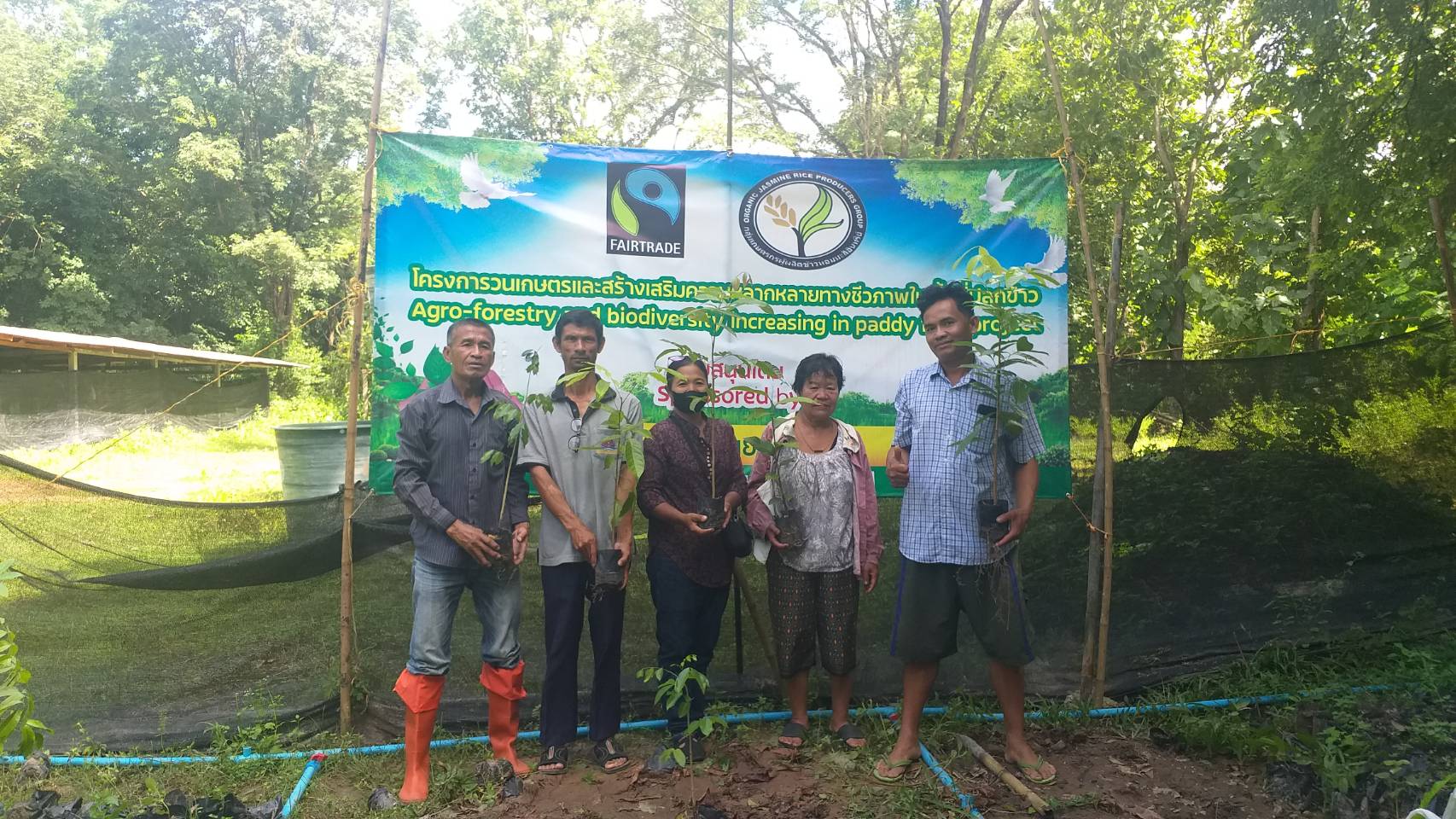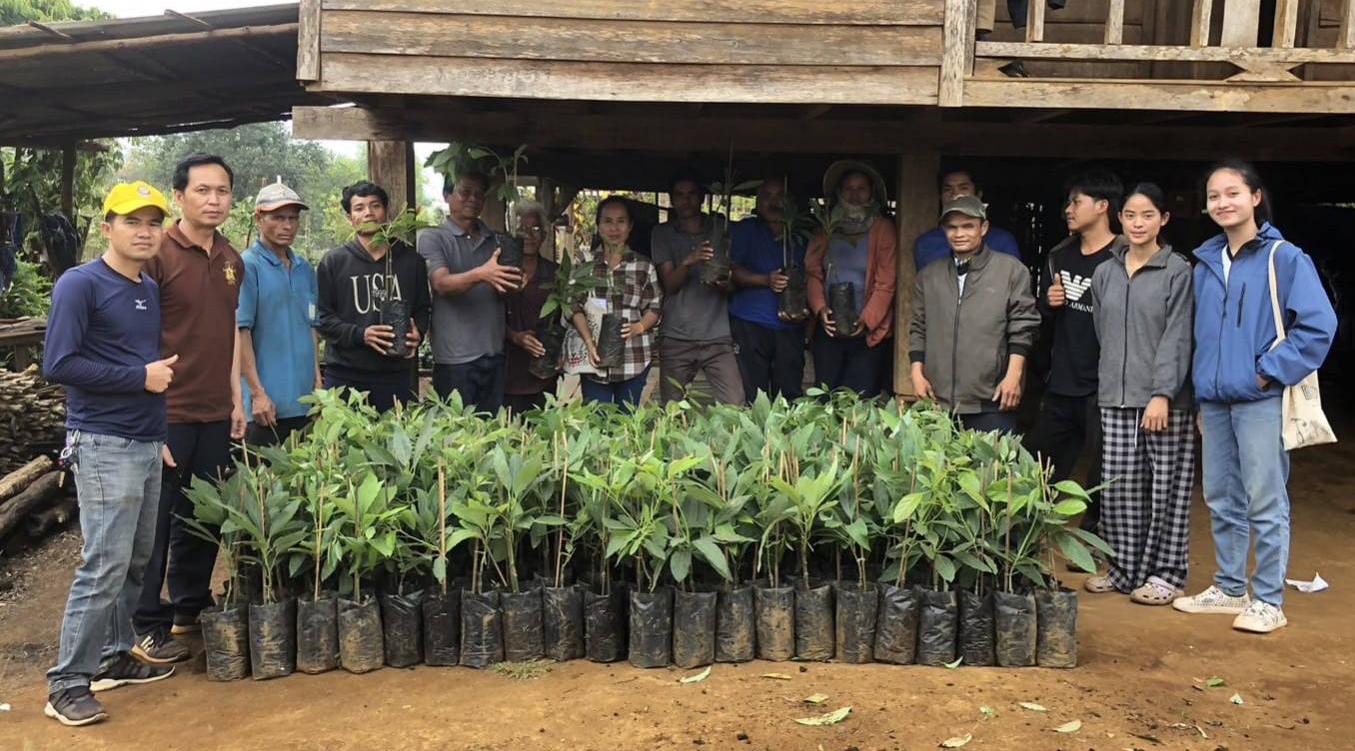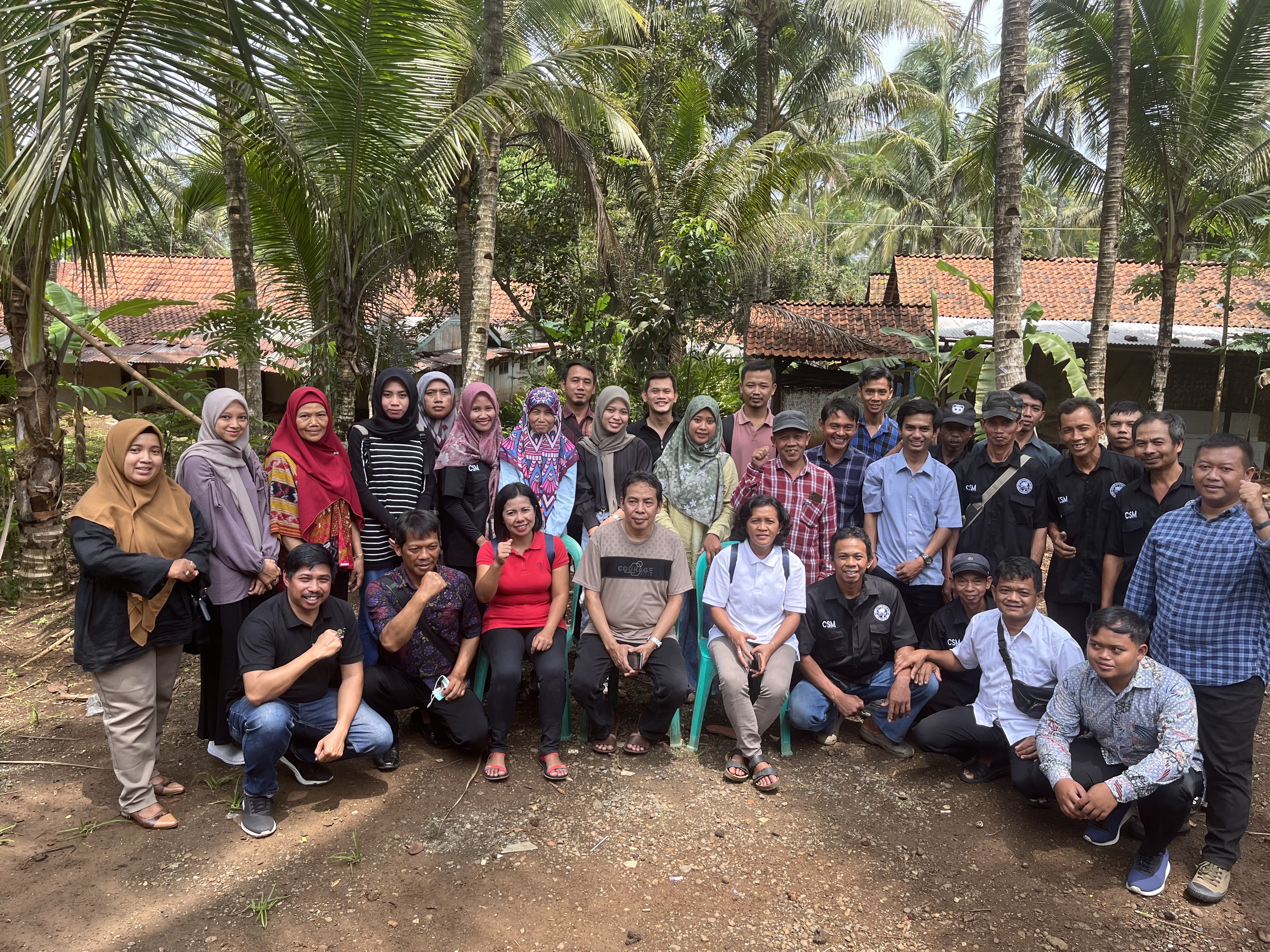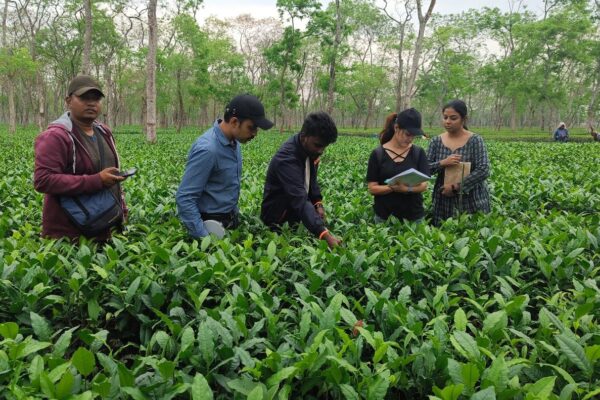One may ponder, what ties these farmers together? The answer lies in a singular, undeniable force: climate change. The implication of climate change has woven a common thread through the lives of farmers in not just in the Asia-Pacific region but across the globe. Today, we are living through climate and nature crises. The depletion of natural assets and soil health is hurting our farmers, endangering the productivity and resilience of our lands. Agriculture is the single largest driver of global biodiversity loss. Today, the global environmental, health, and socioeconomic costs associated with today’s food and land use system totals nearly $12 trillion per year. However, these risks cannot be borne exclusively by farmers. It is imperative to support our farmers through consolidated financial, technical, and educational support systems to mitigate climate change.

Figure: One million tree plantation drive in Vietnam.
Today, the urgency for collective action to combat the effects of climate change has reached unprecedented levels. On this World Environment Day, Fairtrade NAPP (Network of Asia and Pacific Producers) reaffirms its commitment to sustainable practices that go beyond fair wages and working conditions. Since its inception, Fairtrade NAPP has been believed that more must be done for the environment. As an integral part of the Fairtrade ecosystem, it collaborates with other organizations within the network to initiate numerous innovative environmental initiatives across the Asia-Pacific region. As part of Coffee Development Plan, supported by co-funding from Fairtrade Max Havelaar Switzerland, Fairtrade NAPP has been targeting deforestation and climate change issues by yielding significant outcomes in Asia-Pacific Region.
Fairtrade NAPP’s dedication extends beyond individual projects. It pulses through our 2021-2025 Strategy on Climate Change— a blueprint brimming with innovation and advocacy. This comprehensive blueprint encompasses innovative solutions through collaboration with research networks, technological empowerment by providing fair trade-aligned models and renewable energy grids, and decision-making support by equipping farmers with climate scenario models. Additionally, Fairtrade aims to establish a financial safety net for climate finance access, foster soil health, and manage land use changes, while advocating for small producers in global climate discussions and policies. Moreover, our meticulous Coffee Cost of Sustainable Production (COSP) data collection addresses various components of HREDD to prioritize forest protection as a crucial aspect of environmental due diligence. In addition, it formed partnerships with various local authorities across multiple countries to deliver tailored solutions to farmers and enhance their climate resilience efforts. On this World Environment Day, let’s explore some of Fairtrade NAPP’s key endeavours throughout the Asia-Pacific region.
Thailand: Multifaceted approach to climate change adaption and mitigation.
In the province of Amnat Charoen, the FTS Organic Amnat Charoen Community Enterprise Network benefited through its solar-powered water pump initiative. Enabled by Fairtrade funding, this initiative secured a reliable water source for 590 families, spanning from rice mills to training centers. In addition, another Fairtrade NAPP initiative was conducted in the organization for community reforestation project. While improving the quality of life of families of 1400 individuals, it raised awareness of responsibility for the quality of life and the environment to assist the organization to increase green space in public and open spaces.
Mrs. Bang-orn Duangdok, expressing her delight by emphasizing the far-reaching benefits: “The solar water pump will ensure water supply for our rice mill, office, greenhouse, and training center, marking a significant step towards sustainability.”

Figure: Solar water pump initiative.
Across the sunlit fields of Surin, Fairtrade NAPP’s collaboration with the Organic Agriculture Social Enterprise Innovators of Surin (OASIS) introduces a transformative land-leveling project. 60 farmers have benifitted through meticulous water, weed, and resource management. In Surin, the Green Net Cooperative (GNC) initiated sustainable agriculture with Fairtrade NAPP that focuses on soil carbon sequestration for resilient farming. Similarly, in Nam Om Community, 78 families have become climate resilience through the Fairtrade Germany-funded water supply project.
“Usually there was no water in the canal. Often, rice seedlings die and we need to replant the crop, which increases the investment. Without rain, we cannot do anything. We get a poor production in the last year with a low amount of rain. This project brings me hope for better production, better income, and plenty of food as we will have more aquatic animals to feed our family.” – Mrs. Maneechan Jantasing.
The Biodiversity and Agroforestry in Paddy Field project in Thailand facilitated 378 members of the Organic Jasmine Rice Producer Group to boost biodiversity and promotes ecosystem health through the collection of diverse seeds and nurturing strong seedlings.

Figure: Biodiversity and Agroforestry in Paddy Field project to boost biodiversity.
Pakistan: Regenerative agriculture and solar panel distribution
In Pakistan, numerous challenges intersect with climate vulnerabilities, exacerbated by a rapidly growing population placing immense pressure on limited water resources. Acknowledging the water-intensive nature of rice farming, a two-day training session on water resource management aims to promote efficient water use and sustainable agriculture. Collaboratively, Fairtrade NAPP and Fairtrade Germany distributed 72 solar units to four Small Producer Organizations, easing farmers’ burdens and reducing energy costs.
In Pakistan, Shahzad Ali of the Rural Education and Economic Development Society (REEDS) Farmers’ Association has been thankful for solar units as it provides sustainable power supply while transitioning into cleaner energy sources. This enables them to make a modest contribution towards mitigating climate change.
As Pakistan deals with various challenges that intersects with climate vulnerabilities, Fairtrade NAPP, in collaboration with Fairtrade International organised a 2-day training for Fairtrade Producers for climate change adaptation advocacy on hazards. This training was an important catalyst for change that empowered 20 dedicated Fairtrade producers, including 6 inspiring female producers to adopt sustainable practices.
“As we experienced Flooding in Gilgit, I am grateful of the climate change training. It was good to learn the Preparedness strategy for dealing the issue in future as well.” – Farzana Bibi, Mountain Fruits (Pvt) Limited.
Regenerative agriculture is not a new concept. The six core principles of regenerative agriculture include minimizing soil disturbance, maximizing crop diversity, keeping soil covered, maintaining living roots year-round, integrating livestock, and promoting on-farm biodiversity. 25 cotton producers implemented regenerative practices gained through training to enhance soil fertility, sequester atmospheric CO2, and improve water and energy management. Regenerative agriculture is a way of farming to build and improve soil fertility, whilst sequestering and storing atmospheric CO2, increasing on farm diversity and improving water and energy management.

Figure: Training on Climate Change Preparedness on Climate hazards.
The Philippines: Native Tree Restoration Project and Disaster Risk Reduction and Climate Change Adaptation
At the core of the Philippines climate induced disasters, our producers have implemented various initiatives that helped them to mitigate the climate change. This includes the 9 producer organizations who has been at the fore front of climate resilience through the training received at the “Capacity Building on Disaster Risk Reduction and Climate Change Adaptation” program. 27 farmers from six sugarcane producer organizations updated their Environmental Development Policy based on the trainings received by Fairtrade NAPP.

Figure: Capacity Building on Disaster Risk Reduction and Climate Change Adaptation.
In the meantime, 232 coconut farming producers over seven months benefited from Fairtrade NAPP’s “Magtanim Tayo: A Native Tree Reforestation Project” in Mindanao. This project champions agroforestry and biodiversity conservation in the region. Additionally, workshops and learning exchanges organized by Fairtrade NAPP empower six Fairtrade small-scale sugar producers to enhance organic practices and identifying crops for diversification.
“We have become one of the contributors of global warming and climate change because maybe we are going to be involved in cutting down trees if we are not educated of this program. Thank you very much for this help. Through this we can contribute to our community while educating our fellow members.” – Bervinie Subban, Davnor Fairtrade Coco Farmers Association based in Tagum, Davao Del Norte.
“I am very thankful for Magtanim Tayo Program. Before, we just plant here and there without the measurement. Now I know that there is a right way. Planting trees is a great help to our environment. Flooding occurs almost every week due to the impact of mining that has cleared the land. Today, we are the ones who are struggling now from floods and landslides. Let’s plant trees to help our environment.” – a participant from Tical Tribal Multipurpose Cooperative based in Malita, Davao Occidental.
Laos: Climate-Resilient Coffee Farming
In Laos, farmers are taking action to grow coffee that can withstand climate changes. With help from Fairtrade NAPP and funding from Max Havelaar Switzerland, 24,700 local trees by 80 families were planted at their coffee farms. This benefited the producers to make their coffee farms stronger against the changing climate, and improve their coffee growth.

Figure: Plantation of local trees for climate resilience.
India: Innovative Climate Solutions
In India, Fairtrade NAPP piloted Micro Weather Stations for grape farmers in Nashik. 57 farmers received a mobile app for daily climate alerts and recommendations that promoted proactive climate adaptation. Today, rice is one of the main products of the Fairtrade producer network. 34 participants representing 12 Fairtrade Producer Organisations from the Indian states of Jammu, Uttarakhand, and Uttar Pradesh to develop an action plan to reduce theimpact of climate change. These include the development of new-age intervention techniques to comprehend rice farming practices for reducing the impact of Climate change, train more farmers with climate-friendly activities, to increase the scope of study plots under category interventions such as water footprints among others.
“Carbon credit program or training will be very beneficial to the smallholder farmers and thank you for the opportunity to learn the same” – Bhim Chhetri & Farmer, Promoting Body Member, Nature Bio Foods, Kalan Project, India.

Figure: Micro Weather stations installed in Nashik, India.
In addition, Fairtrade NAPP has partnered with Geo Climate Risk Solutions to understands climate change impacts and provide valuable recommendations for sustainable tea production to the tea producer organization. In addition, as part of Coffee Development Plan funded by Max havlaar Switzerland, the farmers from 5 producer organization from South India grasped knowledge of the optimal farming practices, including the usage of biochar and its application for climate change mitigation. The ‘Field to Fanshop’ Project initiative was launched by the Bundesministerium für wirtschaftliche Zusammenarbeit und Entwicklung (BMZ) together with the textile company BRANDS Fashion GmbH and is implemented through Deutsche Gesellschaft für Internationale Zusammenarbeit GmbH with local partners. Over the next three years, the Project will support 450 smallholder farmers in India in converting to organic cotton cultivation from 2022-2025.
Indonesia: Understanding and Adapting to Climate Change
In Aceh, Fairtrade NAPP led a study examining climate change’s impact on coffee farming, fortifying producers’ resilience. Through focus groups and expert interviews, farmers gained insights to tackle climate challenges. In Java and Eastern Indonesia, Fairtrade NAPP collaborated with CCROM-SEAP to provide climate change training to seven Small Producer Organizations. This initiative equipped farmers with practical skills and cost-effective adaptation methods, empowering them to confront evolving environmental conditions head-on. In collaboration with CCROM-SEAP of IPB University, Fairtrade Napp was able to empower 7 Small Producer Organizations (SPOs) in Java and Eastern Indonesia to raise awareness, conduct climate assessments, generate low-cost adaptation measures, and empower individual farmers.
“It has been a more mind opening learning journey for me, I think us as farmers may have always been using weather and climate data, but more in traditional ways, using our senses, intuition and local wisdom. I am particularly interested in the opportunity of carbon trading, how organizations of farmers may be able to seize this opportunity. I realize that we have to do a lot of works in the future and I am glad that activity like this (the training) helps us better in terms of guidance in doing our works,” – Suprapti Suprapti, Koperasi Produsen Manunggal Adil Sejahtera.
 Vietnam: Solar Power for Sustainable Coffee Farming and 1 million tree projects.
Vietnam: Solar Power for Sustainable Coffee Farming and 1 million tree projects.
Vietnam is making significant strides in tree planting and solar energy, cutting CO2 emissions by 4.9 tons annually. Coffee and cashew nut production exemplify sustainable practices, combating deforestation. Producers in Asia are planting 1 million trees for the region’s resilience to climate change, using funds from premiums and their budgets. This effort demonstrates their commitment to Fairtrade principles and contributes to the Sustainable Development Goals. Solar power stations in 5 cooperatives across provinces like Daklak and Kontum transformed the lives of fairtrade producers. Hence, the production efficiency and boosting incomes has also increased as each cooperative benefited from a 10KW capacity.

Figure: Saplings for one million tree project.
Sri Lanka: Sustainable Coconut Farming, Climate Smart Agriculture and Net houses.
Through effective agricultural methods training on coconut farms in Sri Lanka, 30 farmer families have been mitigating the impacts of climate change and boosting productivity in the coconut sector. In Sri Lanka, our programs empower 20 Small Producer Organizations (SPOs) in youth- and gender-sensitive, climate-smart agriculture, positively affecting 6,800 lives. Additionally, the strategic installation of 40 net houses offers vital protection against adverse weather conditions, pests, and diseases. These initiatives enhance resilience through sustainable practices by transforming actions of communities against climate-related adversities.
“As a farmer, net houses are crucial for protecting crops against adverse weather conditions, pests, and diseases. This, in turn, contributes to the sustainability of livelihoods and helps mitigate the impact of price crises on food, energy security and climate change impacts.” – EMAG Maddu mabanda, Medadu Mbara Organic Minor Export Crop Producers Society.

Figure: Net House distribution.
Producers demonstrate their dedication to the planet by investing premiums and personal funds to plant diverse trees, not only certified products but also shade and fruit trees, in communities and on their farms. This grassroots effort aligns with a global imperative for comprehensive action, involving individuals, communities, businesses, and governments to combat climate change through emission reduction, renewable energy adoption, and sustainable practices. Through proactive measures, we address immediate climate threats while charting a course toward resilience and sustainability. Fairtrade NAPP’s initiatives on World Environment Day underscore a commitment to sustainable practices and climate action, empowering communities and fostering innovative solutions for a better future.










